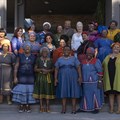4 educational paths to boost socioeconomic empowerment for women

There’s no doubt that South Africa has come a long way since its historic women's march of 1956, when 20,000 women marched to the Union Buildings on 9 August in protest against the extension of Pass Laws to women. However, in modern South Africa, there is much more that needs to be done to ensure that women have fair and equal rights, and opportunities, within our society.
This year’s Women’s Month theme is “Women’s Socioeconomic Rights and Empowerment: Building Back Better for Women’s Improved Resilience”. If we’re talking about achieving better socioeconomic rights for women, then we need to be talking about better access to quality higher education and skills development for women.
According to The Conversation, systemic gender inequality is seen in South Africa’s higher education institutions in the form of skewed enrolments, stereotypical course selection, and poor career progression.
To break these patterns within our education systems, and workplaces, we need to give women in our country every opportunity to achieve education and skills training in high school and beyond, and it starts with looking at how we can enable the next step in their education journey.
Listed below are four accessible paths that we, as a country, can start to take a closer look at. These practical paths can be helpful for women, at any educational level, from completing a matric to pursuing a career in the high-tech fields of engineering, IT and finance.
Adult matric
Previous census data from Statistics South Africa has estimated that less than a third of adults in South Africa have completed matric.
However, there are viable alternatives for adults still wishing to complete this qualification. The Amended Senior Certificate (ASC) was introduced in 2015 for any South Africa, over the age of 21, who still wished to formally complete their matric.
By completing the ASC, you can further your studies with tertiary education or achieve entry-level employment.
The ASC is a useful gateway for those looking to further their career prospects. Reputable education providers offer learners the opportunity to complete their Adult Matric online, making it that much more accessible and achievable.
Accounting and HR
Two fields that are crucial to the world of business these days are accounting and human resources, and there are a growing number of options available when it comes to entering these fields.
For those looking to enter the accounting field, a Chartered Institute of Management Accountant (CIMA) or Institute of Certified Bookkeepers (ICB) qualification are highly regarded courses, which you can enroll for online, after completing your matric.
A National Diploma in Human Resource Management is another valuable qualification, that sets you up for a career in talent acquisition and management, HR management and strategy, and more.
Skilled artisans
For many years, there has been a severe shortage of artisans in South Africa, and there are promising career options in this space.
National trade courses in essential career paths such as boilermaking, welding, fitting and turning, electrical and motor trade — all critical for engineering-related fields — can help learners to gain a foothold in the current market.
While traditionally viewed as male-dominated trades, there is no reason why women can’t become skilled artisans and thrive in their chosen field.
Known as N1, N2 and N3 qualifications, you only need to have completed Grade 9 to enroll in these courses, and once completed, learners can progress further to complete their higher national diploma.
Information technology
Finally, another important field that women can look to enter and take advantage of is that of information technology (IT). With the fourth industrial revolution taking hold and gathering pace, technology is forming the backbone of our economy.
More companies around the world need people skilled in this space to keep their networks operating and their IT infrastructure at optimal levels. Add in to this the recent emergence of data privacy laws such as the Protection of Personal Information (PoPI), and you begin to realise just how important a solid IT system is to every business.
In this regard, there are many avenues that women can pursue, ranging from looking at the various Microsoft and CompTIA certifications and more.
All of these courses, and more, can be studied online via credible education providers, which often have affordable monthly payment options available. This makes quality distance learning a reality for many South African women.































